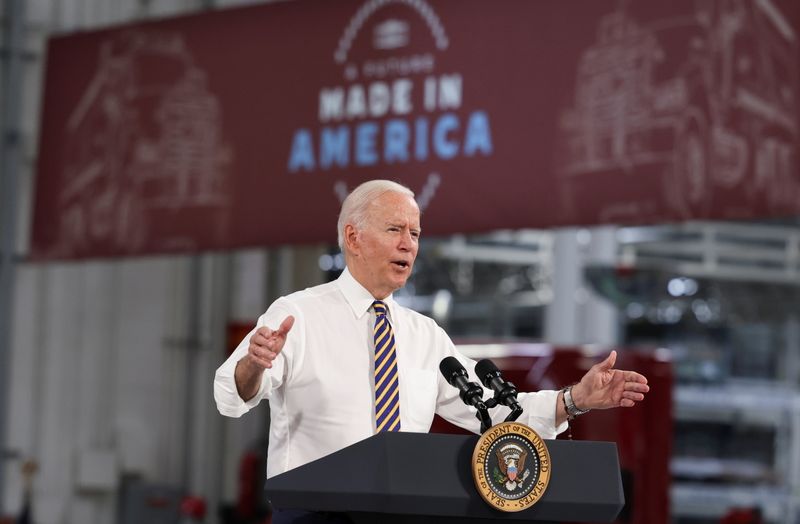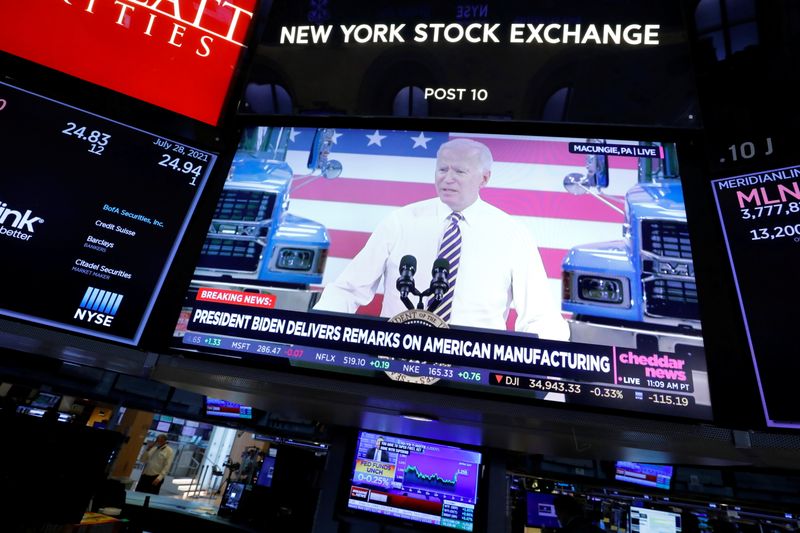By Susan Cornwell and Richard Cowan
WASHINGTON (Reuters) -The U.S. Senate on Thursday prepared to tackle the details of a $1 trillion bipartisan infrastructure bill backed by President Joe Biden, with the possibility of weekend work looming after lawmakers agreed to advance the measure.
Another vote was scheduled for 11:30 a.m. EDT (1530 GMT) on Friday to begin debate on the proposal to rebuild America's roads, ports and bridges, beginning a process that could last for days and could include amendments that change the bill or cloud its chances of passage.
Both Senate Majority Leader Chuck Schumer, a Democrat, and Minority Leader Mitch McConnell, a Republican, were upbeat about the road ahead on the bill, which was brokered by Senate negotiators and White House officials and cleared an important procedural hurdle by a vote of 67-32 on Wednesday.
"It took some prodding and a few deadlines, but it has all worked out for the better," Schumer said on Thursday on the Senate floor.
McConnell, who was among 17 Republicans who voted to advance the measure, called it a "focused compromise" and an "important, basic duty of government."
"I’m glad to see these discussions making progress and I was happy to vote to begin moving the Senate toward what ought to be a robust, bipartisan floor process for legislation of this magnitude," McConnell said.
Some amendments are expected to be proposed, including on the bill's broadband internet provisions, the Senate's number two Republican, John Thune, said, without giving details.
Thune told reporters that he thought some Republicans who voted to advance the measure had not yet committed to supporting the final product.
"A lot of that will depend on scores," or cost estimates of the bill, to be produced by the Congressional Budget Office, he said. The CBO has not said when it will release the estimate, but it could be delayed until there is a full text of the bill.
But Senator Kevin Cramer, a conservative Republican, said CBO had already scored parts of the bill, and their findings, which broadly backed the lawmakers' estimates, were discussed at a Republican lunch Wednesday before the vote. "I think that that was a very important thing for a lot of Republicans that were skeptical going in," Cramer said.
The bipartisan measure is a key component of Biden's larger domestic policy agenda. After it is passed, Democratic leaders plan to move ahead with a sweeping $3.5 trillion budget "reconciliation" package that is expected to include climate and social spending. Republicans have vowed to oppose that effort.
Schumer said on Thursday his goal remains to pass both the bipartisan infrastructure bill and the budget resolution before senators take their summer break, which was supposed to start in the second week of August.
Senator Rob Portman, the lead Republican negotiator on the bipartisan infrastructure plan, said he didn't expect any amendments that would, if adopted, actually threaten passage.
"I haven't heard of any amendments that would be poison pills. So I think people are interested in getting to yes here, even if they didn't vote for the bill tonight," Portman told reporters after Wednesday's vote.
Portman said he hoped there would be plenty of time allowed for amendments so members' concerns are heard. "We want to get a strong vote because we need to send it over to the House, like a torpedo, with plenty of bipartisan support," he said.

The bill must also pass the House of Representatives, where Democrats have a thin majority. Some senior Democrats there, including Representative Peter DeFazio, chairman of the Transportation and Infrastructure Committee, have expressed concern that the bill lacks sufficient climate measures.
"If they send it over here in early August it will sit. It will sit for a very long time, which would give us a chance to engage the experts" before taking action, DeFazio told reporters.
